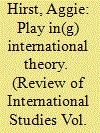| Srl | Item |
| 1 |
ID:
060214


|
|
|
|
|
| Publication |
London, Continuum, 2005.
|
| Description |
x, 226p.
|
| Series |
Continum studies in continental philosophy
|
| Standard Number |
0826475779
|
|
|
|
|
|
|
|
|
|
|
|
Copies: C:1/I:0,R:0,Q:0
Circulation
| Accession# | Call# | Current Location | Status | Policy | Location |
| 049438 | 321.8092/THO 049438 | Main | On Shelf | General | |
|
|
|
|
| 2 |
ID:
170052


|
|
|
|
|
| Summary/Abstract |
This paper investigates the contemporary phenomenon of smuggling sperm from within Israeli jails, which I treat as a biopolitical act of resistance. Palestinian prisoners who have been sentenced to life-imprisonment have recently resorted to delivering their sperm to their distant wives in the West Bank and Gaza where it is then used for artificial insemination. On the level of theory, my analysis of this practice benefits from Jacques Derrida's commentary in The Post Card on imaginative postal delivery of sperm to distant lovers. I use Derrida's heteronormative implication to examine how Palestinian prisoners defy the Israeli carceral system via the revolutionary act of sperm smuggling. The article then argues that smuggling sperm challenges the conventional gender codes in Palestinian society that see women in passive roles. Drawing on Derrida's metaphorical connection between masturbation and writing, I problematize the perception of speech/orality as primary in traditional Palestinian culture. Women, who mostly act as smugglers, become social agents whose written stories of bionational resistance emerge as a dominant mode of representation.
|
|
|
|
|
|
|
|
|
|
|
|
|
|
|
|
| 3 |
ID:
168881


|
|
|
|
|
| Summary/Abstract |
While the study of games and gaming has increased in International Relations in recent years, a corresponding exploration of play has yet to be developed in the field. While play features in several key areas – including game theory, videogames and popular culture, and pedagogical role-plays and simulations – little work has been done to analyse its presence in, and potentials for, the discipline. The aim of this article is to introduce the study of play to IR. It does this by demonstrating that play is political, and that it is at work across the global arena. Drawing on the deconstructive tradition associated with Jacques Derrida, its core contribution is a theorisation of play. The central argument developed is that play is (auto)deconstructive. By this I mean (1) that play precipitates an unravelling of any attempt at its conceptualisation, and (2) that this illustrates the value of a deconstructive approach to international theory. This claim is substantiated through an analysis of four key binary oppositions derived from Johan Huizinga's Homo Ludens. Having shown how play powerfully deconstructs its own conceptual foundations, I argue that a playful approach offers a robust challenge to entrenched assumptions in international theory.
|
|
|
|
|
|
|
|
|
|
|
|
|
|
|
|